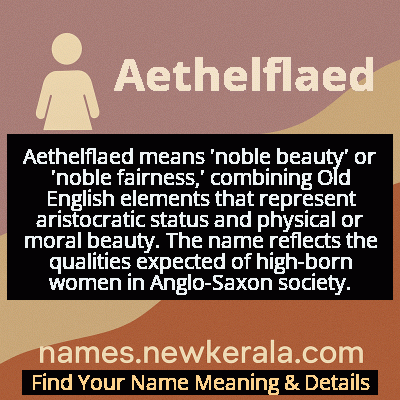Aethelflaed Name Meaning & Details
Origin, Popularity, Numerology Analysis & Name Meaning of Aethelflaed
Discover the origin, meaning, and cultural significance of the name AETHELFLAED. Delve into its historical roots and explore the lasting impact it has had on communities and traditions.
Name
Aethelflaed
Gender
Female
Origin
Anglo
Lucky Number
7
Meaning of the Name - Aethelflaed
Aethelflaed means 'noble beauty' or 'noble fairness,' combining Old English elements that represent aristocratic status and physical or moral beauty. The name reflects the qualities expected of high-born women in Anglo-Saxon society.
Aethelflaed - Complete Numerology Analysis
Your Numerology Number
Based on Pythagorean Numerology System
Ruling Planet
Neptune (Ketu)
Positive Nature
Intuitive, analytical, spiritual, and inquisitive.
Negative Traits
Secretive, reserved, aloof, and can be overly critical.
Lucky Colours
Green, yellow.
Lucky Days
Monday.
Lucky Stones
Cat’s eye, moonstone.
Harmony Numbers
1, 5, 6.
Best Suited Professions
Scientists, researchers, spiritual leaders, detectives.
What People Like About You
Depth of knowledge, analytical skills, spirituality.
Famous People Named Aethelflaed
Æthelflæd, Lady of the Mercians
Ruler and Military Leader
Successfully defended Mercia against Viking invasions and fortified numerous towns
Æthelflæd of Damerham
Anglo-Saxon Noblewoman
Major landholder and religious patron as wife of King Edmund I
Æthelflæd of Ramsey
Abbess and Saint
Renowned for piety and leadership in Anglo-Saxon monastic life
Name Variations & International Equivalents
Click on blue names to explore their detailed meanings. Gray names with will be available soon.
Cultural & Historical Significance
The name itself reflects core Anglo-Saxon aristocratic values, merging the concept of noble lineage (aethel) with ideals of beauty and fairness (flaed). In a culture where names conveyed social standing and personal attributes, Aethelflaed represented both elite status and feminine virtue. Her legacy during England's formative period positions the name as symbolic of English resistance against foreign threats and the safeguarding of Anglo-Saxon traditions during times of profound change and conflict.
Extended Personality Analysis
Those bearing the name Aethelflaed typically exhibit characteristics of strong leadership, intellectual acuity, and strategic thinking, mirroring the historical figure's reputation as an effective ruler and military commander. They often demonstrate innate leadership capabilities coupled with a profound sense of duty and allegiance to their community or family. These individuals usually approach problems with practical solutions, employing careful planning and persistence reminiscent of their namesake who strengthened defenses and organized military responses.
In addition to their strategic talents, individuals named Aethelflaed frequently display refined sensibilities and a deep respect for cultural heritage and traditions. They masterfully balance strength with elegance, showing both the fortitude required to overcome challenges and the diplomatic finesse necessary for building cooperative relationships. Their noble demeanor and commitment to responsibility often position them as natural guardians and champions for those they care about, while their intelligence and foresight allow them to manage intricate circumstances with wisdom and thoughtful consideration.
Modern Usage & Popularity
In contemporary naming practices, Aethelflaed persists as an uncommon yet deeply meaningful selection, predominantly chosen by parents fascinated by Anglo-Saxon history or those desiring a unique name with substantial historical resonance. The name has experienced a modest revival influenced by growing public interest in medieval history stimulated by television productions and historical novels. Though it remains too rare to feature on mainstream popularity rankings, it exemplifies an increasing inclination toward resurrecting ancient names that bear significant historical importance and represent feminine strength. Modern adaptations frequently include simplified spellings such as 'Ethelfleda' or the use of diminutives like 'Flæd' or 'Ethel' to enhance everyday practicality while preserving the name's historical essence.
Symbolic & Spiritual Meanings
Symbolically, Aethelflaed embodies the harmonious integration of aristocratic authority and feminine potency, representing the ideal of 'noble beauty' in both aesthetic and moral dimensions. The name conveys meanings of guardianship, leadership, and cultural conservation, echoing the historical figure's pivotal role in safeguarding Anglo-Saxon England. It signifies the capacity to reconcile conventional feminine qualities with extraordinary influence and command, rendering it representative of women who transcend limitations while honoring their cultural roots. The name further symbolizes endurance amid hardship and the maintenance of cultural legacy during periods of significant social and political evolution.

